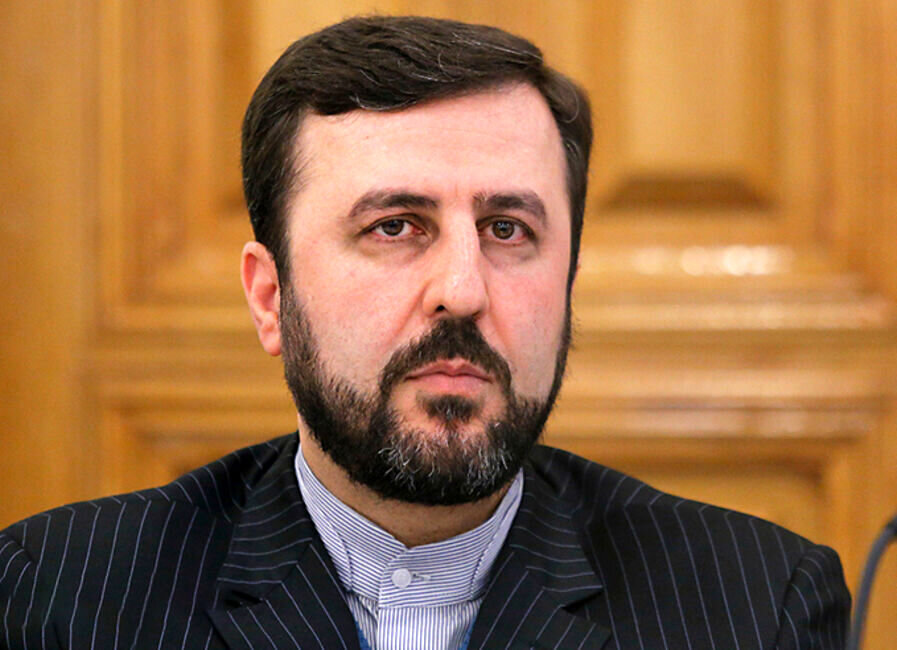Iran criticizes UK intention to deport migrants to Rwanda
“The UK’s dark human rights record speaks for itself”

TEHRAN - The secretary of Iran’s High Council for Human Rights and deputy chief of the Iranian Judiciary has condemned the United Kingdom's decision to transfer asylum seekers to Rwanda.
In a tweet on Wednesday, Kazem Gharibabadi said, “The British government’s plan to forcefully transfer asylum seekers is a breach of its international commitments and responsibilities. The move entirely neglects human and ethical considerations. The UK’s dark human rights record speaks for itself.”
UK Prime Minister Boris Johnson said that certain unlawful migrants and asylum seekers will be transferred to Rwanda, with “tens of thousands” of individuals expected to travel there in the following years.
Opposition parties, human rights organizations, NGOs, and the UN refugee agency, the UNHCR, all reacted angrily to the measure.
Earlier on Saturday, Saeed Khatibzadeh, the spokesman for the Iranian Foreign Ministry, condemned the British government's proclaimed plan as a retreat from the country's international duties.
Transferring refugees outside of British territory, according to Khatibzadeh, violates the spirit and text of the Refugee Convention.
Khatibzadeh went on to say that such a British plan, which places responsibility for refugees on the shoulders of a third country, exposes refugees to violations of the rights mentioned in refugee conventions and human rights agreements, and utterly disregards human and moral concerns.
“Cruel, inhumane, and “neo-colonial”
The British government has been accused of trading people like commodities after it unveiled the controversial plan to send asylum seekers on a one-way ticket 6,000km (3,700 miles) away to Rwanda, Al Jazeera said on April 15.
Rights groups and refugee organizations have called the decision “cruel”, “inhumane” and “neo-colonial”.
“It’s truly shocking and inhumane,” said Steve Valdez-Symonds, the refugee and migrant rights program director at Amnesty International UK.
“The plan is not going to decrease the number of refugees. It will inflict a huge amount of cruelty and fuel more dangerous refugee routes to be set up,” Valdez-Symonds told Al Jazeera.
According to the plan, the British government would screen asylum seekers after arriving and provide their personal information to the Rwandan officials before they are transported to Kigali. The Rwandan government would deal with the asylum process and, if they are successful, asylum seekers will settle in the country.
Some details are still a bit murky but all refugees arriving in the UK in boats will be sent to Rwanda. If their application is successful, they will not be given refugee status in the UK but will be granted asylum by Rwanda. Those unsuccessful could be deported back to their country of origin, or another country where they have a right to reside.
Refugees who flee to the UK from prosecution, civil war and torture have the right to claim refugee status under international agreements. However, they can only claim asylum in the UK on British soil.
Hence, if the proposal is implemented, those fleeing Iraq, Syria, Eritrea or Sudan will most likely be transported to Rwanda even before making an asylum claim – which would eventually lead to a drastic decline in asylum applications.
The proposal will come into an effect after the passage of a law that is currently being considered in Parliament that could criminalize any refugees entering the country without a valid visa. The legislation is expected to pass as Johnson’s party enjoys the parliamentary majority.
The UN’s refugee agency also voiced opposition.
“People fleeing war, conflict and persecution deserve compassion and empathy. They should not be traded like commodities and transferred abroad for processing,” said UNHCR’s Assistant High Commissioner for Protection Gillian Triggs.
The chief executive of Refugee Action, Tim Naor Hilton, accused the government of “offshoring its responsibilities onto Europe’s former colonies instead of doing our fair share to help some of the most vulnerable people on the planet”.
Others, meanwhile, criticized Rwanda’s human rights record.
“There is nothing ‘safe’ or ‘compassionate’ about Boris Johnson’s neo-colonial plan to send refugees to offshore camps in Rwanda, where the government tortures, intimidates and assassinates their political opponents and persecutes marginalized people,” said Bella Sankey, director of Detention Action, an NGO providing support to migrants in detention.
Rwandan Foreign Minister Vincent Biruta said Rwanda is going to provide refugees “a dignified life with shelter, with skills for them to be able to socially and economically integrate into our society, or to have those skills for them to be able to integrate into their country of origin when they decide to go back to their countries”.
The deal, which Home Secretary Priti Patel signed during a visit to Kigali, came as more Ukrainian refugees keep arriving in the UK through various visa programs that the government has rolled out in the wake of Russia’s invasion in February.
So far, more than 55,000 visas have been issued to refugees fleeing the war in Ukraine and 16,400 of them arrived in the UK as of Monday.
Zoe Gardner, policy and advocacy manager at the Joint Council for the Welfare of Immigrants, highlighted the contrast between the proposed policy and the attitude towards Ukrainian refugees.
“Most of us want people fleeing danger to be treated with dignity and respect – the UK public’s response to Ukraine has made that clear,” Gardner told Al Jazeera.
“But instead of welcoming those who need protection,” she said, the deal will be “deporting Black and brown people who have fled desperate circumstances thousands of miles away”.
